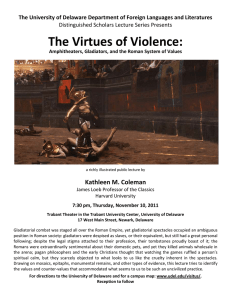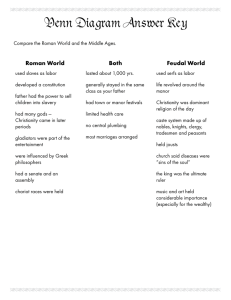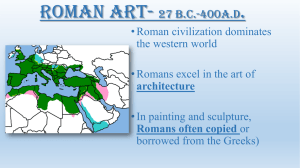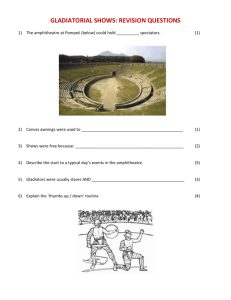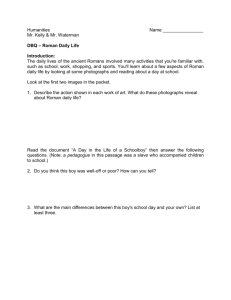1 Ludi ludi saeculares Munus/Munera
advertisement
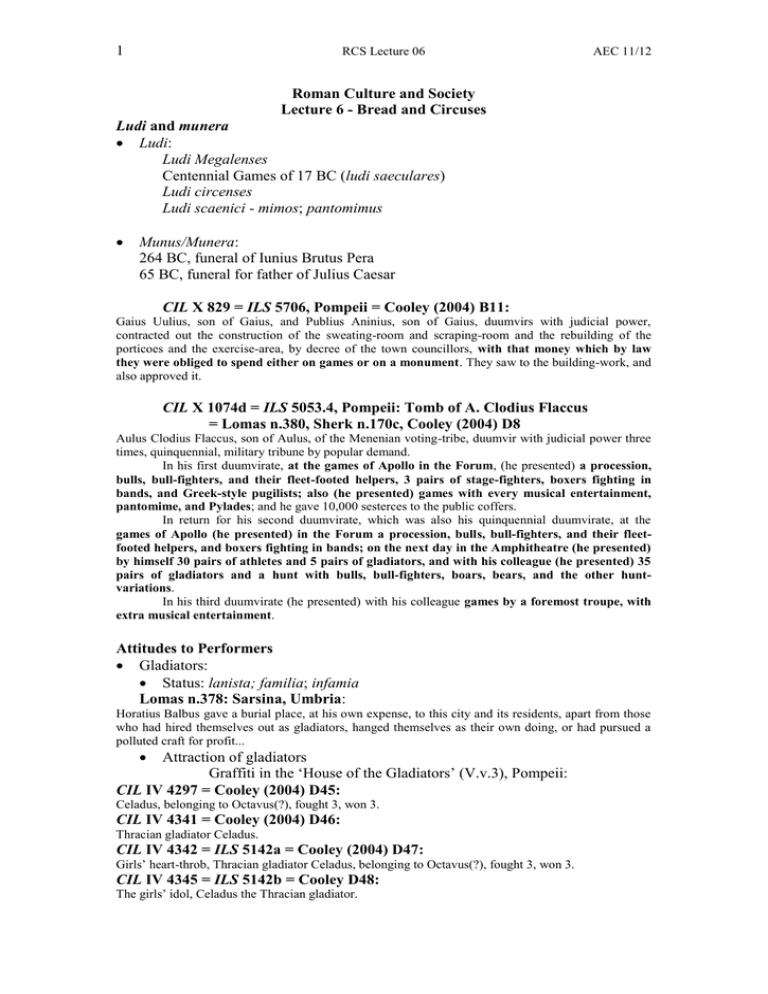
1
RCS Lecture 06
AEC 11/12
Roman Culture and Society
Lecture 6 - Bread and Circuses
Ludi and munera
Ludi:
Ludi Megalenses
Centennial Games of 17 BC (ludi saeculares)
Ludi circenses
Ludi scaenici - mimos; pantomimus
Munus/Munera:
264 BC, funeral of Iunius Brutus Pera
65 BC, funeral for father of Julius Caesar
CIL X 829 = ILS 5706, Pompeii = Cooley (2004) B11:
Gaius Uulius, son of Gaius, and Publius Aninius, son of Gaius, duumvirs with judicial power,
contracted out the construction of the sweating-room and scraping-room and the rebuilding of the
porticoes and the exercise-area, by decree of the town councillors, with that money which by law
they were obliged to spend either on games or on a monument. They saw to the building-work, and
also approved it.
CIL X 1074d = ILS 5053.4, Pompeii: Tomb of A. Clodius Flaccus
= Lomas n.380, Sherk n.170c, Cooley (2004) D8
Aulus Clodius Flaccus, son of Aulus, of the Menenian voting-tribe, duumvir with judicial power three
times, quinquennial, military tribune by popular demand.
In his first duumvirate, at the games of Apollo in the Forum, (he presented) a procession,
bulls, bull-fighters, and their fleet-footed helpers, 3 pairs of stage-fighters, boxers fighting in
bands, and Greek-style pugilists; also (he presented) games with every musical entertainment,
pantomime, and Pylades; and he gave 10,000 sesterces to the public coffers.
In return for his second duumvirate, which was also his quinquennial duumvirate, at the
games of Apollo (he presented) in the Forum a procession, bulls, bull-fighters, and their fleetfooted helpers, and boxers fighting in bands; on the next day in the Amphitheatre (he presented)
by himself 30 pairs of athletes and 5 pairs of gladiators, and with his colleague (he presented) 35
pairs of gladiators and a hunt with bulls, bull-fighters, boars, bears, and the other huntvariations.
In his third duumvirate (he presented) with his colleague games by a foremost troupe, with
extra musical entertainment.
Attitudes to Performers
Gladiators:
Status: lanista; familia; infamia
Lomas n.378: Sarsina, Umbria:
Horatius Balbus gave a burial place, at his own expense, to this city and its residents, apart from those
who had hired themselves out as gladiators, hanged themselves as their own doing, or had pursued a
polluted craft for profit...
Attraction of gladiators
Graffiti in the ‘House of the Gladiators’ (V.v.3), Pompeii:
CIL IV 4297 = Cooley (2004) D45:
Celadus, belonging to Octavus(?), fought 3, won 3.
CIL IV 4341 = Cooley (2004) D46:
Thracian gladiator Celadus.
CIL IV 4342 = ILS 5142a = Cooley (2004) D47:
Girls’ heart-throb, Thracian gladiator Celadus, belonging to Octavus(?), fought 3, won 3.
CIL IV 4345 = ILS 5142b = Cooley D48:
The girls’ idol, Celadus the Thracian gladiator.
2
RCS Lecture 06
AEC 11/12
The virtues of gladiators
Elite gladiators:
Writers of the Augustan History, Life of Commodus 11.10-12:
He engaged in gladiatorial combats, and accepted the names usually given to gladiators with as much
pleasure as if he had been granted triumphal decorations. He regularly took part in the spectacles, and
as often as he did so, ordered the fact to be inscribed in the public records. It is said that he engaged in
gladiatorial bouts 735 times.
Gladiatorial careers
CIL IV 2508 = Cooley (2004) D32:
Games [….] on the 12, 13, 14, 15 May
Reprieved.
Won.
Double swordsman (?) versus heavily armed fighter:
[….]ciens Neronian, fought 20 [… traces of another name ….] 11
Nobilior, Julian, fought 2 […traces of another name...] 14
Reprieved.
Won.
Thracian versus murmillo.
Lucius Sempronius […]
Platanus, Julian […]
Won.
Killed.
Thracian versus murmillo.
Pugnax, Neronian, fought 3.
Murranus, Neronian, fought 3.
Won.
Reprieved.
Heavily armed fighter versus Thracian.
Cycnus, Julian, fought 9.
Atticus, Julian, fought 14.
Won.
Reprieved.
Thracian versus murmillo.
Herma, Julian, fought 4.
Quintus Petillius […]
Reprieved.
Won.
Chariot-fighters.
Publius Ostorius, fought 51.
Scylax, Julian, fought 26.
Won.
Killed.
Thracian versus murmillo.
Nodu[…], Julian, fought 7.
Lucius Petronius, fought 14.
Killed.
Won.
Thracian versus murmillo.
Lucius Fabius, fought 9.
Astus, Julian, fought 14.
Actors – infamia
Chariot drivers
ILS 5287 = Sherk no.167: C. Appuleius Diocles
Consolidating the hierarchy of Roman society
Seating arrangements
Spectators in Amphitheatres
Rome - Flavian Amphitheatre
3
RCS Lecture 06
AEC 11/12
Pompeii – seating capacity according to Bomgardner: 2,064 + 7,466 +
13,607 + 1,120
Theatres
Lex Iulia Theatralis
Suetonius Augustus 44:
He put a stop by special regulations to the disorderly and indiscriminate fashion of viewing the games,
through exasperation at the insult to a senator, to whom no one offered a seat in a crowded house at
some largely attended games in Puteoli. In consequence of this the Senate decreed that, whenever any
public show was given anywhere, the first row of seats should be reserved for Senators; and at
Rome he would not allow the envoys of the free and allied nations to sit in the orchestra, since he was
informed that even freedmen were sometimes appointed. He separated the soldiery from the people.
He assigned special seats to the married men of the commons, to boys under age their own section
and the adjoining one to their preceptors; and he decreed that no one wearing a dark cloak should sit in
the middle of the house. He would not allow women to view even the gladiators except from the
upper seats, though it had been the custom for men and women to sit together at such shows. Only the
Vestal virgins were assigned a place to themselves, opposite the praetor's tribunal. As for the contests
of the athletes, he excluded women from them so strictly, that when a contest between a pair of boxers
had been called for at the games in honour of his appointment as pontifex maximus, he postponed it
until early the following day, making proclamation that it was his desire that women should not come
to the theatre before the fifth hour.
Pompeii theatre remodelled
Circus Maximus: 150,000 capacity
Public executions: the noxii
Mosaics from Zliten
Martial On the Spectacles 7:
As, tied up on a Scythian rock, Prometheus fed the untiring bird with his too prolific heart, so
Laureolus, hanging on no unreal cross, gave up his internal organs defenceless to a Caledonian bear.
His mangled limbs lived, though the parts dripped gore, and in all his body was nowhere a body’s
shape. A punishment deserved at length he won – he in his guilt had with his sword pierced his parent’s
or his master’s throat, or in his madness robbed a temple of its close-hidden gold, or had laid by stealth
his savage torch to you, Rome. Accursed, he had outdone the crimes told of by ancient lore; in him that
which had been a show before was punishment.
Monumentalizing the Spectacles
'Euergetism' - public benefaction
o Announcements of forthcoming shows:
CIL IV 7991, Pompeii = Cooley (2004) D20:
20 pairs of gladiators of Gnaeus Alleius Nigidius Maius, quinquennial, and their substitutes will fight
without any public expense at Pompeii.
CIL IV 7990, Pompeii = Cooley (2004) D24:
Good fortune to Gnaeus Alleius Maius, the leading games-giver.
Gladiators on Tombs at Pompeii:
Painting
Relief on marble from necropolis at Stabian Gate, AD 20-50
Graffiti
CIL IV 10237:
Games at Nola of Marcus Cominius Heres over 4 days.
‘The Chief’, Neronian, fought 13, 10 victories, victor. [This text replaces the following one, crossed
out.] Hilarus, Neronian, fought 14, 12 victories, victor. Creunus, fought 7, 5 victories, reprieved.
4
RCS Lecture 06
AEC 11/12
Mosaic of Magerius
Smirat - troop of arena hunters (the Telegenii) - Spittara, Bullarius, Hilarinus,
Mamertinus - fighting leopards- Victor, Crispinus, Romanus, Luxurius
‘My Lords, so that the Telegenii [name of troop of beast hunters], in exchange for a
leopard, may receive the prize of your approval, give them 500 denarii’
2. ‘By your example, may future men learn thus what a show is! May past men learn of it!
1.
From what source have we ever had such a show? When have we ever had such a show?
You provide a show according to the example of the quaestors, you give a show at your
own expense; that day is yours. Magerius is the donor. This is what it is to be rich, this is
what it is to be powerful, this is the case now! Night is already here. The performers have
been dismissed with money-bags from your show’.
Unsuccessful euergetism:
Petronius, Satyricon 45
‘After all, what has Norbanus ever done for us? He produced some decayed twopennyhalfpenny gladiators, who would have fallen flat if you breathed on them; I have seen better ruffians
turned in to fight the wild beasts.’
Disaster at Fidenae
Tacitus, Annals 4.62-63: AD 27
A sudden disaster which now occurred was as destructive as a major war. It began and ended in a
moment. An ex-slave called Atilius started building an amphitheatre at Fidenae for a gladiatorial show.
But he neither rested its foundations on solid ground nor fastened the wooden superstructure securely.
He had undertaken the project not because of great wealth or municipal ambition but for sordid profits.
Lovers of such displays, starved of amusements under Tiberius, flocked in – men and women of all
ages. Their numbers, swollen by the town’s proximity to Rome, intensified the tragedy. The packed
structure collapsed, subsiding both inwards and outwards and precipitating or overwhelming a huge
crowd of spectators and bystanders... Fifty thousand people were mutilated or crushed to death in the
disaster. The senate decreed that in future no one with a capital of less than four thousand sesterces
should exhibit a gladiatorial show, and no amphitheatre should be constructed except on ground of
proved solidity.
Political Spectacles
Construction of the Flavian Amphitheatre ('Colosseum')
New Flavian dynasty. Replacing domus aurea; AD 80
Jewish war link
Imp(erator) Caes(ar) Vespasianus Aug(ustus)
amphitheatrum novum
ex manubiis fieri iussit
‘Victorious Commander Caesar Vespasian Augustus ordered the new amphitheatre to be built from the
spoils of war’.
Condemnation of Nero
Games to celebrate opening
Martial – On the Spectacles
Commemoration on coins, c.AD 80
Ludus Magnus (Great Training School)
Politics in Circus Maximus: triumphal arch for Titus - ILS 264:
…because in accordance with his father's precepts, planning & auspices he tamed the nation of the
Jews, and the city of Jerusalem - which all generals, kings, and nations before him had either assaulted
in vain or avoided altogether - he utterly destroyed
Imperial control over gladiators
5
RCS Lecture 06
AEC 11/12
Displays of power over nature
Late Republic: elite competition - M. Aemilius Scaurus 58 BC: Plin. HN 8.40.96.
Pompey: Plin. HN 8.20.53.
Augustus: Dio Cass. 54.26.1; Plin. HN 8.24-25.64-65 = LACTOR Age of Augustus K53,
R25
Imperial monopoly.
Relationship of audience and emperor
Fronto, Elements of History 18 = Shelton n.379:
Because of his shrewd understanding of political science, the emperor Trajan gave his attention even to
actors and other performers on stage or on the race track or in the arena, since he knew that the Roman
people are held in control principally by two things – free grain and shows – that political support
depends as much on the entertainments as on matters of serious import, that neglect of serious
problems does the greater harm, but neglects of the entertainments brings damaging unpopularity, that
gifts are less eagerly and ardently longed for than shows, and, finally, that gifts placate only the
common people on the grain dole, singly and individually, but the shows placate everyone.
Acclamations and Demands
o Theatre: Suetonius, Life of Augustus 53:
He always felt horrified and insulted when called 'My Lord'. Once, while he was watching a comedy,
one of the players spoke the line: 'O just and generous Lord!' whereupon the entire audience rose to
their feet and applauded, as if the phrase referred to Augustus. A look and a gesture soon quelled this
unsuitable flattery, and the next day he issued an edict of stern reprimand.
o Suetonius Life of Domitian 13:
on the day of his public banquet he delighted to hear the audience in the amphitheatre shout ‘Long live
our Lord and Lady!.
o Riot at Pompeii, AD 59, Nucerians
Tacitus, Annals 14.17 = Cooley (2004) D34:
At around the same time, there arose from a trifling beginning a terrible bloodbath amongst the
inhabitants of the colonies of Nuceria and Pompeii at a gladiatorial show given by Livineius Regulus,
whose expulsion from the senate I have recorded previously. Inter-town rivalry led to abuse, then
stone-throwing, then the drawing of weapons. The Pompeians in whose town the show was being given
came off the better. Therefore many of the Nucerians were carried to Rome having lost limbs, and
many were bereaved of parents and children. The emperor instructed the senate to investigate; they
passed it to the consuls. When their findings returned to the senators, the Pompeians were barred from
holding any such gathering for ten years. Illegal associations in the town were dissolved; Livineius and
the others who had instigated the trouble were exiled.
o Cf Law-code Digest 48.19.28.3:
Some, who call themselves commonly “young people”, are in certain cities in the habit of participating
in the turbulent acclamations of the mob. If they have not committed anything worse and have not been
previously warned by the authority, they are sent off with a beating or else the shows are forbidden
them.
o Riot painting at Pompeii: Cooley (2004) D37 - House of Actius
Anicetus "Good fortune to Decimus Lucretius/ Good fortune to Satrius Valens,
Augustus Nero" - Cooley (2004) D37b
Self-promotion by local elite
Shows to promote status quo
adverts – Pompeii
CIL IV 1180, outside the main entrance of the Gladiatorial Barracks, on the external
wall of the Large Theatre, AD 70-79:
For the well-being of the [emperor Vespasian] Caesar Augustus and of his children, [and on account of
the] dedication of the altar, [the gladiatorial troupe] of Gnaeus [All]eius Nigidius Maius, priest of
Caesar Augustus, will fight at Pompeii, without delay, on the 4 July. There will be a hunt and awnings.
6
RCS Lecture 06
AEC 11/12
Family connections: CIL IV 7995:
Of Decimus Satrius Valens, priest in perpetuity of Nero Caesar son of Augustus, twenty pairs of
gladiators; and of Decimus Lucretius Valens his son, ten pairs of gladiators on 28th March, there will
be a wild-beast hunt, and awnings.
Greek East: displays of culture, not power?
Different flavour to spectacles in Gk East
Almost every city in Gk East had its own festival, over several days.
Privileges for performers - 'Worldwide athletes' guild'; 'Worldwide synod
of Dionysiac artists'
C. Iulius Demosthenes at Oenoanda (Lycia)
‘Demostheneia’, AD 124
Letter of Had:
The Emperor Caesar Trajan Hadrian Augustus… greets the magistrates, council and people of
the Termessians. I praise Iulius Demosthenes for the patriotic zeal he has shown to you, and I confirm
the musical competition which he has promised to you. He himself will contribute the cost from his
own treasuries….
Demosthenes' promise:
I, C. Iulius Demosthenes… publicly promise a theatrical festival to be called the
Demostheneia…
Theatres converted for gladiators
Dio Chrysostom, Orations 31.121-22
[121] But as matters now stand, there is no practice current in Athens which would not cause any man
to feel ashamed. For instance, in regard to the gladiatorial shows the Athenians have so zealously
emulated the Corinthians, or rather, have so surpassed both them and all others in their mad infatuation,
that whereas the Corinthians watch these combats outside the city in a glen, a place that is able to hold
a crowd but otherwise is dirty and such that no one would even bury there any freeborn citizen, the
Athenians look on at this fine spectacle in their theatre under the very walls of the Acropolis, in the
place where they bring their Dionysus into the orchestra and stand him up, so that often a fighter is
slaughtered among the very seats in which the Hierophant and the other priests must sit. [122] And the
philosopher who spoke about this matter and rebuked them they refused to obey and did not even
applaud; on the contrary, they were so incensed that, although in blood he was inferior to no Roman,
but enjoyed a reputation greater than any one man has attained for generations, and was admittedly the
only man who since the time of the ancients had lived most nearly in conformity with reason, this man
was forced to leave the city and preferred to go and live somewhere else in Greece.
Infiltration by the emperor: emperors as Olympian victors – Nero:
Suetonius Nero 25:
Returning from Greece …at Rome he rode in the chariot which Augustus had used in his triumphs in
days gone by, and wore a purple robe and a Greek cloak adorned with stars of gold, bearing on his head
the Olympic crown and in his right hand the Pythian, while the rest were carried before him with
inscriptions telling where he had won them and against what competitors, and giving the titles of the
songs or the subject of the plays. His car was followed by his clique as by the escort of a triumphal
procession, who shouted that they were the attendants of Augustus and the soldiers of his triumph.
Conclusions
Significance of 'entertainment'
Changes over time
7
RCS Lecture 06
AEC 11/12
Roman Culture and Society
Bread and Circuses - Lecture 06, Bibliography
Key readings
@Coleman, K.M. (1990) ‘Fatal charades: Roman executions staged as
mythological enactments,’ Journal of Roman Studies 80: 44-73
@Barton, C. A. (1993) The Sorrows of the Ancient Romans: The Gladiator
and the Monster (Princeton: Princeton University Press) [DG 78.B2] ch.1
General reading
Beard, M. (2008) Pompeii. The life of a Roman Town ch.8
Coleman, K. (2000) 'Entertaining Rome', 210-58 in Coulston, J. and H.
Dodge, Ancient Rome. The Archaeology of the Eternal City (Oxford) [DG
65.A6]
Coleman, K. (2010) 'Spectacle' in The Oxford Handbook of Roman Studies,
eds A. Barchiesi & W. Scheidel [DG 209.O94]
Coleman, K. (2011) 'Public entertainments' in M. Peachin, ed., The Oxford
Handbook of Social Relations in the Roman World [on order]
@Lomas, K. and T. Cornell, eds (2002) Bread and Circuses (Routledge,
London) (espec. chapters by Holleran and Coleman) [DG 95.B7]; intro
@Mitchell, S. (1990) 'Festivals, Games, and Civic Life in Roman Asia Minor',
JRS 80: 183-93
@Pobjoy, M. (2000) 'Building inscriptions in Republican Italy' in The
Epigraphic Landscape of Roman Italy (ed.) A.E. Cooley (BICS Supplement,
London) [CN 530.E7]
@Rogers, G.M. (1991) 'Demosthenes of Oenoanda and models of
euergetism', JRS 81: 91-100
Amphitheatres and their spectacles
@Auguet, R. (1972) Cruelty and Civilization: The Roman Games (London:
Allen and Unwin) [DG 95.A8] ch.7
@Barton, C. A. (1993) The Sorrows of the Ancient Romans: The Gladiator
and the Monster (Princeton: Princeton University Press) [DG 78.B2] ch.1
Beard, M. & Hopkins, K. (2005) The Colosseum [DG 68.1.H6]
@Bomgardner, D. (2000) The Story of the Roman Amphitheatre (Routledge,
London) [NA 313.B6 + e-book] ch.5
@Coleman, K. (1993) 'Launching into history: aquatic displays in the early
Empire' JRS 83: 48-74
Fagan, G. (2011) The lure of the arena : social psychology and the crowd at
the Roman games [HF 4062.5.F2]
@Futrell, A. (1997) Blood in the Arena. The Spectacle of Roman Power
(University of Texas Press, Austin) [DG 95.F8] 'The imperial games'
Hekster, O. (2002) Commodus. An emperor at the crossroads (Gieben,
Amsterdam) ch. 4 [DG 299 H3]
Hope, V. (2000) 'Fighting for identity: the funerary commemoration of Italian
gladiators' in The Epigraphic Landscape of Roman Italy (ed.) A.E. Cooley (BICS
Supplement, London) [CN 530.E7]
Hopkins, K. (1983) Death and Renewal (Cambridge) [DG 103.H6]
Jacobelli, L. (2003) Gladiators at Pompeii (Rome) [DG 95.J2]
8
RCS Lecture 06
AEC 11/12
Köhne, E. and C. Ewigleben (2000) Gladiators and Caesars: the power of
spectacle in ancient Rome (London: British Museum) [qto DG 95.G5]
@Kyle, D.G. (1998) Spectacles of death in ancient Rome (London:
Routledge) [DG 95.K9] 'Introduction'
Poliakoff, M. (1987) Combat Sports in the Ancient World: Competition,
Violence, and Culture (New Haven) [GV 573.P6]
Welch, K. (2003) The Roman Amphitheatre from its origins to the Colosseum
[NA 313.W4]
@Wiedemann, T. (1992) Emperors and Gladiators (London: Routledge) [DG
95.W4] Ch 4 'Opposition and abolition'
Wistrand, M. (1992) Entertainment and Violence in Ancient Rome: The
Attitudes of Roman Writers of the First Century A. D. (Acta Universitatis
Gothoburgensis, Göteborg) [DG 95.W4]
Theatre
Beacham, R. (1991) The Roman theatre and its audience (Routledge,
London) [PA 6067.B3]
Hanson, J.A. (1978) Roman Theatre-Temples [NA 325.T5]
Slater, W.J., ed. (1996) Roman Theater and Society (Ann Arbor) [PA
6067.R6]
Circuses
Humphrey, J.H. (1986) Roman Circuses [DG 95.H8]
Sourcebooks
@Cooley, A.E. & M.G.L. (2004) Pompeii. A Sourcebook (Routledge: London
& New York) [DG 70.P + e-book] chapter 4
Futrell, A. (2006) The Roman Games (Blackwell, Oxford) [DG 95.F8]
Lomas, K. (1996) Roman Italy 338 BC- AD 200. A sourcebook (London: UCL
Press) [DG 13.R6]
@Parkin, T. & Pomeroy, A. (2007) Roman Social History. A Sourcebook [DG
78.R6 + e-book]
Shelton, J-A. (1998) As the Romans did: a sourcebook in Roman social
history (2nd edn, New York; Oxford: Oxford University Press) [DG 78.S4]
Sherk, R.K. (1988) The Roman Empire: Augustus to Hadrian (CUP) [DG
275.R6]

